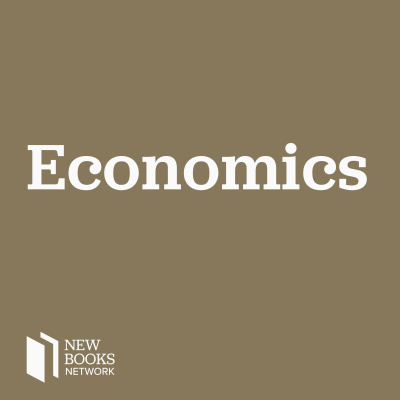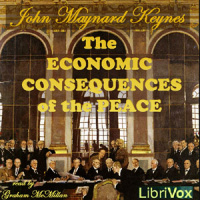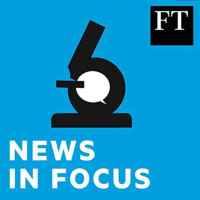Synopsis
Interviews with Economists about their New Books
Episodes
-
Jeff Neilson, "Fortress Farming: Agrarian Transitions, Livelihoods, and Coffee Value Chains in Indonesia" (Cornell UP, 2025)
25/10/2025 Duration: 44minOver the last several decades, sources of income derived away from farms have come to play a much bigger role in rural Indonesian households. How do rural people in Indonesia engage with farming and social and economic spheres beyond their villages? What do their changing forms of engagement mean for land relations, sustainability, and the future of agrarian communities? Jeff Neilson’s Fortress Farming: Agrarian Transitions, Livelihoods, and Coffee Value Chains in Indonesia (Cornell UP, 2025) offers an explanation that centers on a defensive livelihood strategy observed among, in particular, coffee producing smallholders. This livelihood strategy, understood as “fortress farming”, is undertaken by smallholder households that are reluctant to maximize production despite their engagement with major coffee roasting companies. Instead, they maintain their small farms to defend themselves from insecurity while pursuing sources of wealth off farm. The book considers the implications of fortress farming for broader
-
R. Jisung Park, "Slow Burn: The Hidden Costs of a Warming World" (Princeton UP, 2025)
25/10/2025 Duration: 44minR. Jisung Park is assistant professor at the University of Pennsylvania, where he holds appointments in the School of Social Policy and Practice and the Wharton School of Business.It’s hard not to feel anxious about the problem of climate change, especially if we think of it as an impending planetary catastrophe. In Slow Burn: The Hidden Costs of a Warming World (Princeton UP, 2025), R. Jisung Park encourages us to view climate change through a different lens: one that focuses less on the possibility of mass climate extinction in a theoretical future, and more on the everyday implications of climate change here and now.Drawing on a wealth of new data and cutting-edge economics, Park shows how climate change headlines often miss some of the most important costs. When wildfires blaze, what happens to people downwind of the smoke? When natural disasters destroy buildings and bridges, what happens to educational outcomes? Park explains how climate change operates as the silent accumulation of a thousand tiny con
-
Teresa M. Mares and Laura-Anne Minkoff-Zern, "Will Work for Food: Labor Across the Food Chain" (U California Press, 2025)
22/10/2025 Duration: 33minFood consumers are demanding a healthier and more sustainable food system. Yet labor is rarely part of the discussion. In Will Work for Food: Labor Across the Food Chain (U California Press, 2025), Laura-Anne Minkoff-Zern and Teresa Mares chronicle labor across the food chain, connecting the entire food system--from fields to stores, restaurants, home kitchens, and even garbage dumps. Using a political economy framework, the authors argue that improving labor standards and building solidarity among frontline workers across sectors is necessary for creating a more just food system. What would it take, they ask, to move toward a food system that is devoid of human exploitation? Combining insights from food systems and labor justice scholarship with actionable recommendations for policy makers, the book is a call to action for labor activists, food studies students and scholars, and anyone interested in food justice. Learn more about your ad choices. Visit megaphone.fm/adchoices Support our show by becoming a pr
-
Deborah Gordon, "No Standard Oil: Managing Abundant Petroleum in a Warming World" (Oxford UP, 2021)
20/10/2025 Duration: 46minIn No Standard Oil: Managing Abundant Petroleum in a Warming World (Oxford University Press, 2021), Deborah Gordon shows that no two oils or gases are environmentally alike. Each has a distinct, quantifiable climate impact. While all oils and gases pollute, some are much worse for the climate than others. In clear, accessible language, Gordon explains the results of the Oil Climate Index Plus Gas (OCI+), an innovative, open-source model that estimates global oil and gas emissions. Gordon identifies the oils and gases from every region of the globe–– along with the specific production, processing, and refining activities–– that are the most harmful to the planet, and proposes innovative solutions to reduce their climate footprints. Global climate stabilization cannot afford to wait for oil and gas to run out. No Standard Oil shows how we can take immediate, practical steps to cut greenhouse gas emissions in the crucial oil and gas sector while making sustainable progress in transitioning to a carbon-free energ
-
Christopher F. Jones, "The Invention of Infinite Growth: How Economists Forgot About the Natural World" (Simon and Schuster, 2025)
17/10/2025 Duration: 52minMost economists believe that growth is the surest path to better lives. This has proven to be one of humanity’s most powerful and dangerous ideas. It shapes policy across the globe, but it fatally undermines the natural ecosystems necessary to sustain human life. How did we get here and what might be next?In The Invention of Infinite Growth: How Economists Forgot About the Natural World (Simon and Schuster, 2025), environmental historian Christopher F. Jones takes us through two hundred and fifty years of economic thinking to examine the ideal of growth, its powerful influence, and the crippling burdens many decisions made in its name have placed on us all. Jones argues that the pursuit of growth has never reflected its costs, because economists downplay environmental degradation. What’s worse, skyrocketing inequality and diminishing improvements in most people’s well-being mean growth too often delivers too little for too many. Jones urges economists to engage more broadly with other ways of thinking, as wel
-
Lily Hsueh, "Corporations at Climate Crossroads: Multilevel Governance, Public Policy, and Global Climate Action" (MIT Press, 2025)
17/10/2025 Duration: 36minDr. Lily Hseuh is trained as an economist and public policy scholar, and is an associate professor in Economics and Public Policy in the School of Public Affairs, at Arizona State University. Her research bridges the fields of economics, public policy, and management to investigate how the environment and the global commons are managed and the ways in which behaviors of firms and organizations are shaped by multiple forces from markets to government policies. During her tenure at ASU, she has been a two-time recipient of the Distinguished Teaching Award, as well as receiving the Professor of Impact award Her work been featured in major news outlets, including the Financial Times, Fortune, and PBS News Hour, and recently, she was awarded an American Fellowship by the American Association of University Women. She earned her PhD in Public Policy and Management from the University of Washington, and before her just published book, she has been asked to contribute a chapter to a number of other publications an
-
Joe Wiggins, "The Intelligent Fund Investor: Practical Steps for Better Results in Active and Passive Funds" (Harriman House, 2022)
16/10/2025 Duration: 01h06minInvesting in funds is not straightforward. We are faced with a countless range of options and constantly distracted by meaningless noise and turbulent markets. To make matters worse, our flawed beliefs and behavioural biases lead to repeated and costly mistakes, such as a damaging obsession with past performance and a dangerous attraction to thematic funds. There is a solution―a more intelligent way to invest in funds. In The Intelligent Fund Investor: Practical Steps for Better Results in Active and Passive Funds (Harriman House, 2022), experienced portfolio manager and behavioural finance expert Joe Wiggins brings simplicity and clarity to fund investing. Each chapter of this fascinating and highly readable book focuses on a vital element of investing in funds―exploring how and why investors can get it badly wrong, and providing direct, actionable steps for better results. Joe reveals: why we should avoid investing with star managers; how to decide between active and passive funds; why we should beware of s
-
Allen B. Downey, "Probably Overthinking It: How to Use Data to Answer Questions, Avoid Statistical Traps, and Make Better Decisions" (U Chicago Press, 2023)
10/10/2025 Duration: 01h02minStatistics are everywhere: in news reports, at the doctor's office, and in every sort of forecast, from the stock market to the weather. Blogger, teacher, and computer scientist Allen B. Downey knows well that people have an innate ability both to understand statistics and to be fooled by them. As he makes clear in this accessible introduction to statistical thinking, the stakes are big. Simple misunderstandings have led to incorrect medical prognoses, underestimated the likelihood of large earthquakes, hindered social justice efforts, and resulted in dubious policy decisions. There are right and wrong ways to look at numbers, and Downey will help you see which are which. Probably Overthinking It: How to Use Data to Answer Questions, Avoid Statistical Traps, and Make Better Decisions (University of Chicago Press, 2023) uses real data to delve into real examples with real consequences, drawing on cases from health campaigns, political movements, chess rankings, and more. He lays out common pitfalls--like the
-
Michael Glass, "Cracked Foundations: Debt and Inequality in Suburban America" (U Pennsylvania Press, 2025)
07/10/2025 Duration: 01h02minHow debt and speculation financed the suburban American dream and led to today’s inequalities In the popular imagination, the suburbs are synonymous with the “American Dream” of upward mobility and economic security. After World War II, white families rushed into newly built suburbs, where they accumulated wealth through homeownership and enjoyed access to superior public schools. In this revelatory new account of postwar suburbanization, historian Michael R. Glass exposes the myth of uniform suburban prosperity. Focusing on the archetypal suburbs of Long Island, Cracked Foundations: Debt and Inequality in Suburban America (U Pennsylvania Press, 2025) uncovers a hidden landscape of debt and speculation. Glass shows how suburbanites were not guaranteed decent housing and high-quality education but instead had to obtain these necessities in the marketplace using home mortgages and municipal bonds. These debt instruments created financial strains for families, distributed resources unevenly across suburbs, and
-
Richard Duncan, "The Money Revolution: How to Finance the Next American Century" (John Wiley & Sons, 2022)
06/10/2025 Duration: 55minIn The Money Revolution: How to Finance the Next American Century, economist and bestselling author Richard Duncan lays out a farsighted strategy to maximize the United States' unmatched financial and technological potential. In compelling fashion, the author shows that the United States can and should invest in the industries and technologies of the future on an unprecedented scale in order to ignite a new technological revolution that would cement the country’s geopolitical preeminence, greatly enhance human wellbeing, and create unimaginable wealth. This book also features a history of the Federal Reserve. Richard Duncan has served as Global Head of Investment Strategy at ABN AMRO Asset Management in London, worked as a financial sector specialist for the World Bank in Washington, D.C., and headed equity research departments for James Capel Securities and Salomon Brothers in Bangkok, Thailand. He is now the publisher of Macro Watch, a video-newsletter that analyzes the forces driving the global economy in
-
Angela Jones and Barbara G. Brents, "Sex Work Today: Erotic Labor in the Twenty-First Century" (NYU Press, 2024)
05/10/2025 Duration: 37minA cutting-edge volume on current trends in sex work, from sugar relationships and cyber brothels to financial domination, sex worker activism, and feminist porn Sex is for sale in more ways than ever. It can be bought and sold online, in sex clubs, on the street, and around the world. As with many industries, discrimination, exploitation, and inequality persist in sex work. Yet it also offers autonomy, job satisfaction, and even pleasurable experiences for those involved. Sex Work Today: Erotic Labor in the Twenty-First Century by Dr. Bernadette Barton, Dr. Barbara G. Brents, and Dr. Angela N. Jones explores these contradictions, offering an intimate look at the benefits and challenges of sex work across geographic contexts. Featuring thirty-one original essays by sex workers, advocates, researchers, and activists, Sex Work Today is the first compilation of research on new forms of digital sex such as camming, sugar dating, and AI sex dolls. Providing a lens to understand contemporary labor dynamics and the
-
John L. Campbell, "Pay Up!: Conservative Myths about Tax Cuts for the Rich" (Cambridge UP, 2025)
26/09/2025 Duration: 34minSince the Reagan era, conservatives in the United States have championed cutting taxes, especially for wealthy individuals and corporations, as the best way to achieve economic prosperity. In his new book, Pay Up!: Conservative Myths about Tax Cuts for the Rich (Cambridge UP, 2025) John L. Campbell shows that while these claims are highly influential, they are also wrong. Using historical and cross-national evidence, the book challenges and refutes every justification conservatives have made for tax cuts - that American taxes are too high; they hurt the economy; they facilitate government waste; they constitute an unfair downward redistribution of income; and they threaten individual freedom - and conversely shows that countries can actually benefit from higher taxes, especially when tax increases fall most heavily on those most able to pay them. Through clear prose and a well-reasoned argument, Campbell's book provides an accessible, engaging, and much-needed perspective on the role of taxes in American soci
-
J. Doyne Farmer, "Making Sense of Chaos" (Yale UP, 2024)
25/09/2025 Duration: 59minWe live in an age of increasing complexity--an era of accelerating technology and global interconnection that holds more promise, and more peril, than any other time in human history. The fossil fuels that have powered global wealth creation now threaten to destroy the world they helped build. Automation and digitization promise prosperity for some, unemployment for others. Financial crises fuel growing inequality, polarization, and the retreat of democracy. At heart, all these problems are rooted in the economy, yet the guidance provided by economic models has often failed. Many books have been written about J. Doyne Farmer and his work, but Making Sense of Chaos (Yale UP, 2024) is the first in his own words. It presents a manifesto for how to do economics better. In this tale of science and ideas, Farmer fuses his profound knowledge and expertise with stories from his life to explain how we can bring a scientific revolution to bear on the economic conundrums facing society. Using big data and ever more p
-
Edward Fishman, "Chokepoints: American Power in the Age of Economic Warfare" (Portfolio, 2025)
23/09/2025 Duration: 01h18s“The acme of skill,” Sun Tzu wrote in The Art of War, is not “to win one hundred victories in one hundred battles,” but “to subdue the enemy without fighting.” The author of Chokepoints: American Power in the Age of Economic Warfare (Portfolio, 2025) has devoted much of his career to exploring how economic power can advance this goal. He served on the teams at the U.S. State Department that designed and negotiated Western sanctions against Russia after its 2014 annexation of Crimea, and whose economic pressure campaign against Iran led to a landmark nuclear deal in 2015. Economic warfare is how America fights its most important geopolitical battles today. From thwarting Iran’s pursuit of nuclear weapons to checking Russian imperialism and China’s bid for world mastery, the United States has reached into its economic arsenal to get the job done. In the process, the world economy has become a battlefield. Its weapons take the form of sanctions, export controls, and investment restrictions. Its commanders are no
-
Xiang Biao and Wu Qi, "Self as Method: Thinking Through China and the World" (Palgrave Macmillan, 2022)
22/09/2025 Duration: 01h39minToday I had the pleasure of talking to Professor Xiang Biao on his new book, Self as Method: Thinking Through China and the World, which was originally written and published in Chinese. The English translation has just come out with Palgrave Macmillan. Self as Method provides a manifesto of intellectual activism that counsels China’s young people to think by themselves and for themselves. Consisting of three conversations between Xiang Biao, a social anthropologist, and Wu Qi, a rising journalist, the book probes how China has reached its current stage and how young people can make changes. The Chinese version, 把自己作为方法, was named the “most impactful book of 2021” by Dou4ban4, China’s premier website for rating books, films, and music. The English version, which is entirely Open Access and downloadable for free, was translated by David Ownby. The book reached 157,000 downloads in just over a couple of months. Dr. Suvi Rautio is an anthropologist of China. Learn more about your ad choices. Visit megaphone.fm/ad
-
Susan Erikson, "Investable! When Pandemic Risk Meets Speculative Finance" (MIT Press, 2025)
20/09/2025 Duration: 35minInvestable! When Pandemic Risk Meets Speculative Finance (MIT Press, 2025) by Dr. Susan Erikson presents a critical and sobering look at how international bankers and investors turn pandemics into investment opportunities, and what we stand to lose when we rely on “innovative finance.” In a world increasingly defined by crisis, bankers and investors behind the scenes turn catastrophes like pandemics into financial securities that can be bought and sold. Offering new insights into how the excesses of capitalism shape pandemic preparedness, Investable! is an ethnography of World Bank bonds designed to solve a big-ticket global health problem by getting international investors to gamble on future crises. In this first book-length treatment of pandemic bonds, award-winning medical anthropologist Dr. Erikson explains how we got here and asks who should hold the responsibility for the terrible things that happen to people, at a time when pandemics are turned into casinos.Dr. Erikson, who traveled over 300,000 mile
-
Our Common Future: The Birth of Liberal Environmentalism
19/09/2025 Duration: 01h08minThis is the second episode of Cited Podcast’s new season, Green Dreams. Green Dreams tells stories of radical environmental thinkers and their dreams for our green future. Should we make those dreams reality, or are they actually nightmares? For the rest of the episodes, visit the series page, and subscribe today (Apple, Spotify, RSS). An Albertan oil man and a socialist policy wonk from Saskatchewan banded together to think up “eco-development,” a precursor to today’s sustainable development. This unlikely duo forged a global consensus at the United Nations, effectively codifying the reigning orthodoxy of liberal environmental governance. They told us that capitalism and sustainability are indeed compatible. Might that be the most utopian of all green dreams? Learn more about your ad choices. Visit megaphone.fm/adchoices Support our show by becoming a premium member! https://newbooksnetwork.supportingcast.fm/economics
-
Janick Marina Schaufelbuehl, "Crusading for Globalization: US Multinationals and Their Opponents Since 1945" (U Pennsylvania Press, 2025)
11/09/2025 Duration: 01h06minCrusading for Globalization: US Multinationals and Their Opponents Since 1945 (University of Pennsylvania Press, 2025) tells the story of an extraordinarily influential group of business executives at the helms of the largest US multinational corporations and their quest to drive globalization forward over the last eight decades. Janick Marina Schaufelbuehl argues that the spectacular expansion of international investment, trade, and production after 1945 cannot be understood without considering the role played by these corporate globalizers and the organization they created, the US Council (today’s United States Council for International Business). By shaping governmental policy through their congressional lobbying and close connections to successive presidential administrations, US Council members, including executives from General Electric, Coca Cola, and IBM, among others, consistently fought for ever more market deregulation, culminating in the creation of the World Trade Organization in 1995. Crusading
-
Andrea Louise Campbell, "Taxation and Resentment: Race, Party, and Class in American Tax Attitudes" (Princeton UP, 2025)
10/09/2025 Duration: 57minWhy Americans favor progressive taxation in principle but not in practice Most Americans support progressive taxation in principle, and want the rich to pay more. But the specific tax policies that most favor are more regressive than progressive. What is behind such a disconnect? In Taxation and Resentment: Race, Party, and Class in American Tax Attitudes (Princeton UP, 2025), Andrea Louise Campbell examines public opinion on taxation, exploring why what Americans favor in principle differs from what they accept in practice. Campbell shows that since the federal income tax began a century ago, the rich have fought for lower taxes through reduced rates and a complicated system of tax breaks. The resulting complexity leaves the public confused about who benefits from the convoluted tax code, and leads to tax preferences that are driven by factors other than principles or interests. Campbell argues that tax attitudes vary little by income, or by party, as some Democrats, more Republicans, and even more indepe
-
David J. Lynch, "The World's Worst Bet: How the Globalization Gamble Went Wrong (And What Would Make It Right)" (PublicAffairs, 2025)
05/09/2025 Duration: 58minThe triumphant globalization that began in the 1990s has given way to a world riven by conflict, populism, and economic nationalism. In The World's Worst Bet: How the Globalization Gamble Went Wrong (And What Would Make It Right), (PublicAffairs, 2025) David J. Lynch offers a trenchant, fast-paced narrative of the rise and fall of the greatest engine of prosperity the world has ever known. Lynch explains what went right, what went wrong, and what needs to change to preserve the benefits of global integration and to build prosperity for all Americans. Lynch brings a deep understanding of the forces affecting Americans’ lives to his portrayal of a fascinating cast of characters: presidents and policymakers; factory workers whose anger over lost jobs reshaped a nation’s politics; and the anti-globalization warriors of the right and left. Their stories show how the United States made a bad bet on globalization, gambling that it could enjoy its benefits while ignoring its costs: dislocated workers, vulnerable s














